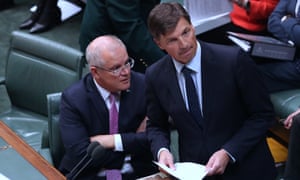In a combative question time the energy minister suggests the Coalition has an ‘open mind’ on nuclear power
Angus Taylor
has flagged the Morrison government has an “open mind” about pursuing
nuclear power during a combative question time where the energy minister
was pursued about rising emissions and his meetings with officials
about the protection of grassland in the south-eastern highlands.
Taylor, who is the minister for energy and emissions reduction, was asked repeatedly by Labor on Tuesday whether emissions had risen in recent years, whether he supported calls by government backbenchers to establish a nuclear industry, and whether he had declared any relevant conflicts when meeting departmental officials.
Guardian Australia revealed in June that Taylor met with Josh Frydenberg’s office and department officials to discuss the federal government’s designation of the critically endangered grasslands known as the natural temperate grassland of the south-eastern highlands.
The meetings occurred at the same time that New South Wales and
federal investigations were under way into the poisoning of about 30
hectares that contained the grasses on a property in the state’s Monaro
region owned by Jam Land Pty Ltd.Taylor, who is the minister for energy and emissions reduction, was asked repeatedly by Labor on Tuesday whether emissions had risen in recent years, whether he supported calls by government backbenchers to establish a nuclear industry, and whether he had declared any relevant conflicts when meeting departmental officials.
Guardian Australia revealed in June that Taylor met with Josh Frydenberg’s office and department officials to discuss the federal government’s designation of the critically endangered grasslands known as the natural temperate grassland of the south-eastern highlands.
One of the directors of that company is Richard Taylor, the minister’s brother, and the minister himself holds an interest in the firm via his family investment company, Gufee.
After lobbying by Taylor, Frydenberg’s office canvassed whether protections for the grasslands – known as the natural temperate grassland of the south-eastern highlands – could be watered down and if the change had to be published.
Taylor has said the briefing he received from the department was unrelated to the investigation, and on Tuesday told parliament he was pursuing the issue on behalf of farmers in his electorate. “I make absolutely no apology for seeking and receiving a briefing on policies that seriously impact farmers in my electorate because I care about farmers in my electorate.” He said he “always” disclosed relevant personal interests.
Emails obtained by Guardian Australia under freedom of information showed Frydenberg’s office specifically requested the department’s assistant secretary of compliance, Monica Collins, attend. Collins did not attend but another compliance officer went to the meeting in her place.
Asked whether a compliance officer was at the meeting, Taylor said on Tuesday he wasn’t aware who was in attendance at the time. “I didn’t ask those people to come to a meeting. My understanding is there was a compliance officer there.”
While Taylor has repeatedly said he sought the meeting in his capacity as the Member for Hume, the critically endangered grasslands are mainly found on the Monaro plains in the Eden-Monaro electorate, not in Hume. However, some communities of the grassland are found in Taylor’s electorate.
As well as being pressed on his grassland discussions with officials, Taylor was asked repeatedly whether emissions had in fact risen in recent years, with data showing increases for the past three years, and whether the government would lift the ban on nuclear power.
The minister for emissions reduction said pollution went “up and down” but he acknowledged emissions had risen, arguing the trend was attributable to booming liquefied natural gas exports, which he claimed helped lower global emissions. In sharing that rationale, which experts have contested, Taylor did not mention Australia’s coal exports, which increase global pollution.
In relation to nuclear energy, Taylor told parliament Australia currently had a moratorium on nuclear power generation “and the government has no plans to change that”. Then he said: “Now we always approach these things with an open mind.”
Queenslanders James McGrath and Keith Pitt have been lobbying internally for the government to lift the nuclear ban even though previous inquiries have found nuclear energy is not economically viable without a carbon price, which the Liberal and National parties say they don’t support.
During the election campaign, the prime minister, Scott Morrison, appeared to open the door to Australia having a nuclear industry, saying “if it can pay its way”, the industry should be allowed to operate. But after facing a backlash from Labor, Morrison said the government had “no plans” to change the law to allow nuclear power in Australia.
The shadow climate change minister, Mark Butler, said after question time on Tuesday: “Nuclear energy is banned in Australia, but with so many Coalition MPs now advocating its use, Australians deserve to know where the government is headed on energy policy.
“In particular, it should explain where nuclear power plants might be built, particularly since these facilities need to be sited near large bodies of water.”

No comments:
Post a Comment